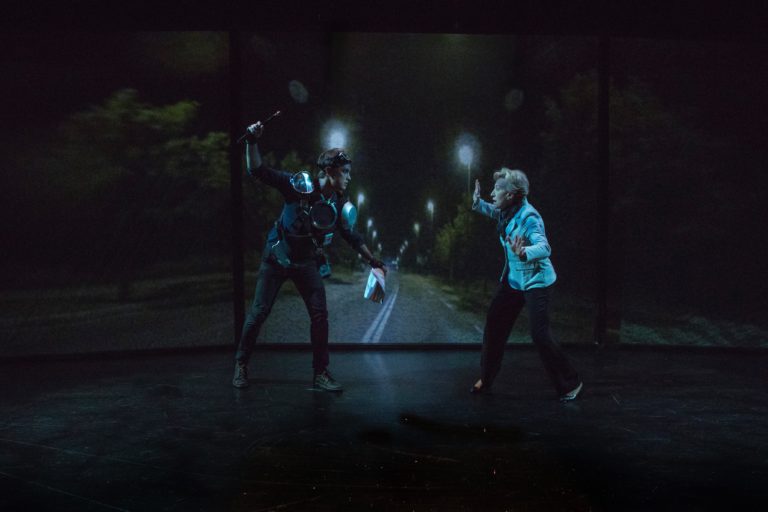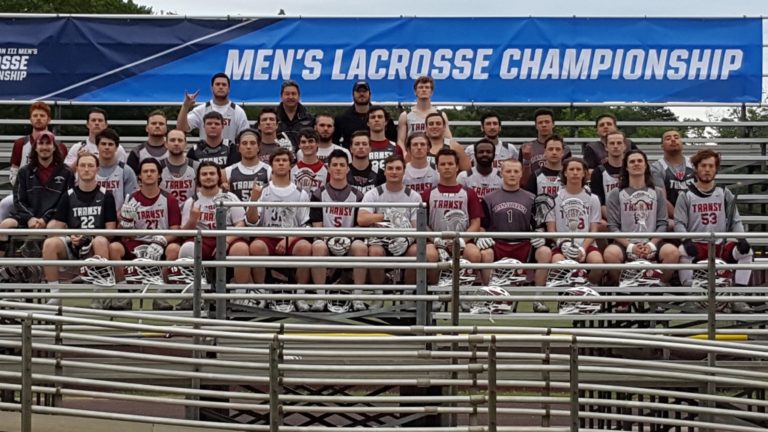Welcome to The Playlist. Every Week, Rambler staff will share a playlist of their favorite songs about a particular theme or mood. This week, we’re all headed back to school.
BadMouth Theatre Company breaks out of the Transy bubble
In the summer of 2015, two undergraduate students with nothing better to do had an idea. Blake Taylor and Joe Bahena wanted to create a theater company. Bahena and Taylor chose to independently produce their own plays due to the lack of opportunities provided by the Transylvania theatre department. The small size of the school and the drama program do not have the capabilities to accommodate what would be a seven to fifteen show season at a larger university.

The concept for the theatre company did not come to fruition until a year or so later when Taylor suggested that they pick a script and start fundraising. Through the crowd sharing site, gofundme.org, Taylor and Bahena were able to raise enough money to cover the costs of production for their first play, Constellations (written by Nick Payne). This year, the theatre company is sponsored by Reynolds Insurance Agency. They chose to rent a space in the Downtown Arts Center that has the technological capabilities they were looking for, and they were able to afford the space through Gofundme. Taylor and Bahena choose a play about a year in advance and fundraise in the meantime.
“We would not be able to do this without our supporters,” says Bahena. There was also a lack of opportunities to direct and produce shows created by students, but the main reason that the two young men founded BadMouth was to serve as a creative outlet for Lexington’s theatre community.
“Honestly I think every theatre major should be producing outside in the community,” says Bahena on his experience at BadMouth. “What we are doing is really subversive. Young people don’t usually have as much fire power in the theater world. Blake and I get to choose the work we do and the people we want to work with. That’s more creative power than many mid career producers have. We educate, direct, advertise, organize, produce.”
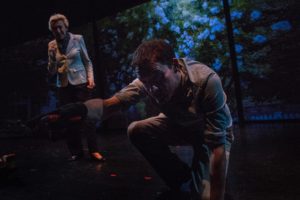
The artistic freedom allows the cofounders to explore new ways of relating to the audience through their work and make changes to their show at the last minute if need be. Bahena says he has aged ten years, artistically since the two produced Constellations during the fall of last year. “Our first show was balls to the walls nuts. Our second show is like: oh, you wanted a twist?” says Bahena.
According to Taylor, “everyone who sees the show will find something familiar to identify with.”
The new show, Neighborhood 3: Requisition of Doom requires certain actors, like Dr. Simonetta Cochis, to play more than one character. Cochis takes on several mother archetypes with different wigs. She acts with such dedication to character and development one might forget she is one of Transylvania’s French professors. Cochis has been acting since high school and does story-telling performances, including those of a 12th-century writer named Marie De France, which she performs in the original Old French. Many of the collaborators from last year’s show have returned for this year’s play. Other cast members include seniors Aaron Botts, Griffin Cobb, junior Amberlee Stemmer, alums Maggie Garnett and Nikki Ramos. The two person play, Constellations included Transylvania senior Abigail Hamilton who debuts her stage managing skills in Neighborhood 3. Transylvania students both past and present as well as actors from Lexington’s own theatre community. Local actors include Burley Thomas, Jessika Cummins, Jamarcus Shelton and Brad Ulery.
The BadMouthians (as they call themselves), according to Taylor, “…aim to create and build community, with consistent effort to broaden the audience and ways where other people can be involved.” The closeness between the collaborators and their theatre company has helped the productions run smoothly and provides a place of mutual support in the realm of Lexington theatre.
Neighborhood 3: Requisition of Doom is playing September 8-10 at the Pam Miller Downtown Arts Center.
Rambler Staff Picks: Places in Lexington
New to Lexington? Take a look at the Rambler staff’s suggestions for places to visit!
 Tristan Reynolds (Editor-in-Chief): The Kentucky Theater is a really excellent place to see independent movies (if you’re a snobby cinéaste like I am). It’s pretty quiet for most showings, so you don’t have to worry about rude interruptions from groups of teenagers who insist that their phones are more interesting than the movie. They also host plenty of local film festivals, and regular screenings of movies like Rocky Horror that encourage audience engagement and a fun atmosphere. It’s pretty cool stuff.
Tristan Reynolds (Editor-in-Chief): The Kentucky Theater is a really excellent place to see independent movies (if you’re a snobby cinéaste like I am). It’s pretty quiet for most showings, so you don’t have to worry about rude interruptions from groups of teenagers who insist that their phones are more interesting than the movie. They also host plenty of local film festivals, and regular screenings of movies like Rocky Horror that encourage audience engagement and a fun atmosphere. It’s pretty cool stuff.
 Aaron Martin (Managing Editor): Doodles is one of my favorite local restaurants. Since it’s open every day except Monday, it can be a nice place to go to in the mornings before class to get some extra studying in. During nice weather, they have the option to sit outside and eat which is refreshing and something I especially love. The staff there is so welcoming and kind and if you go there enough (or in my case, too much) they actually remember your face and your order which is kind of rare to find in a city. They now offer discounts to any Transy student on any day so that, of course, is always an added bonus. Overall, the environment is just really nice and soothing and a place I would definitely recommend. (P.S. make sure to order some beignets!)
Aaron Martin (Managing Editor): Doodles is one of my favorite local restaurants. Since it’s open every day except Monday, it can be a nice place to go to in the mornings before class to get some extra studying in. During nice weather, they have the option to sit outside and eat which is refreshing and something I especially love. The staff there is so welcoming and kind and if you go there enough (or in my case, too much) they actually remember your face and your order which is kind of rare to find in a city. They now offer discounts to any Transy student on any day so that, of course, is always an added bonus. Overall, the environment is just really nice and soothing and a place I would definitely recommend. (P.S. make sure to order some beignets!)

Isaac Batts (Copy Editor): Sqecial media is a great book store/odds and ends (rocks, gems, incense, etc) store/weird things store! It’s located at 371 S Limestone, next to the McDonald’s, so a fair bit away but walkable. It’s in the upper part of an old home that has a Korean restaurant (HanWooRi, also a great spot!). When you walk in the Korean restaurant is on the left and there’s a set of stairs leading up into Sqecial or down into a record shop (I think, it may have changed, I’m not sure)
 Taylor Mahlinger (A&E Editor): Vinaigrette for food and Daily Offerings Coffee Roastery for the best coffee ever!!! (plus it’s organic and very hipster).
Taylor Mahlinger (A&E Editor): Vinaigrette for food and Daily Offerings Coffee Roastery for the best coffee ever!!! (plus it’s organic and very hipster).
 Megan Schandel (Commentary Editor): For those willing to walk a little further from campus, Wild Fig Books & Coffee is an excellent place to grab a cup of coffee or a bite to eat and find a new book to read. Located in a historic house on North Limestone, Wild Fig hosts open mic nights and several reading events throughout the year. This family-owned business is a hidden gem worth visiting. Located on 726 N Limestone.
Megan Schandel (Commentary Editor): For those willing to walk a little further from campus, Wild Fig Books & Coffee is an excellent place to grab a cup of coffee or a bite to eat and find a new book to read. Located in a historic house on North Limestone, Wild Fig hosts open mic nights and several reading events throughout the year. This family-owned business is a hidden gem worth visiting. Located on 726 N Limestone.
Golf makes 11th straight NCAA Championship appearance
The NCAA Division III Men’s Golf Championship is anything but a new experience for Transy’s Men’s Golf team. This year marks the 11th consecutive appearance in the championship for the pioneers. This comes after winning the Heartland Collegiate Athletic Conference Tournament for the 11th year.
While the team has made the tournament since 2006, there is only one player on this year’s five man team that has been there before. Sophomore Blake Young finished the season in seventh place at the HCAC tournament and 51st at last year’s NCAA Championship. Joining him on the team will be First-year Spencer McKinney who finished the HCAC tournament in fifth place. Junior Clay Church, who finished tied for 12th place at the HCAC tournament, will also join them. The fourth member of the team, junior Carson Wattenbarger, finished tied for 23rd place in the HCAC tournament. The final member of the team, senior Rob Canady, won the individual HCAC championship and was named the 2017 HCAC Most Valuable Player for Men’s Golf. It would have taken a lot of hard work and dedication for Canady to get to where he is today, in being the prestigious golfer he is known to be in this Championship. Continued work on and off the course, and maybe some help from something like this skytrak simulator, can help him to improve on his game all year round without needing to worry about the weather. If all players were as determined and as devoted to the sport as Canady, then this Championship will be as competitive as ever. Canady, in addition to the 2017 HCAC Most Valuable Player, was named to the 2017 Division III PING All-Region Team, as was as a Srixon/Cleveland All-America Scholar. When asked about his successful final season with the Pioneers, Canady had this to say, “It feels really great to have won the conference championship and conference MVP in not only my senior year but also my first time playing in the conference championship. But more importantly, I was so excited that we were able to come together as a team and win the conference championship and earn a spot in the NCAA championship. We have all put in a lot of hard work and effort this year and it was really awesome to see that pay off this past weekend. It was a big moment for us as a team because we obviously had a lot of pressure on us to win after winning the last 10 in a row and we were able to get through that and win. I think it gives us a lot of momentum going into the NCAA championship to maybe finally win one, especially since we all have a lot of experience on the course at Mission Inn. I’d really like to thank Coach Lane and Coach Latham for being such great coaches and getting us into position to compete like we have, all of the parents for their support all year and all of my teammates for making this such a great final golf season.”
Mission Inn, the site of the NCAA Championship is a familiar venue to the Pioneers. Earlier this season, Transy competed in the NCAA Preview Tournament which was played at the same site. In the 2012 season, which would end in Transy being runner up, Mission Inn was again the site of the Championship. The first round of the championship would find Transy in a four way tie for 14th place. This puts them only 11 strokes behind the current leader of the tournament, Huntingdon College, who finished the first day with 293 shots. Individually McKinney would be in a 14 way tie for 25th place. Church and Young both finished only one stroke behind McKinney. Wattenbarger finished the day at eight over par 80 and Canady with a 84.
What you have missed in the Stanley Cup playoffs and what could happen
With the ending of the second round of the Stanley Cup Playoffs, we start to get a clearer picture of which team will be the next to hoist the cup this summer. The Nashville Predators ended the regular season in the wildcard spot, setting them up to play the Chicago Blackhawks, ranked first in the Central Division. These rankings meant nothing as Nashville made quick work of Chicago. The best of seven series was over as quickly as it started with the Predators sweeping the series 4-0. Moving on, they faced the St. Louis Blues, fresh off a 4-1 series victory over the Minnesota Wild.
The series would get more interesting when Nashville Mayor Megan Barry and St. Louis Mayor Lyda Krewson bet city-themed gift baskets on the series. Over the next six game, the two teams would go back and forth with the Predators gaining the upper have after winning both games three and four. The series would end in game six with a Nashville victory, sending them to the Western Conference Final against the Anaheim Ducks.
The Ducks, ranked first in the Pacific Division, started their playoff run much like Nashville, taking the wildcard Calgary Flames out of the postseason after just four games, sweeping the series. They would then move on to face the Edmonton Oilers under new captain Connor McDavid. Anaheim would get off to a slow start, losing the first two games, but would come back to win the next three. Game six was another story though, as the Oilers would dominate the game, winning with a score of 7-1, forcing a game seven. It was unclear as to who would win game seven as the Ducks had come back from a two game deficit but had been beaten so badly in the previous game. The Ducks made it clear that they would fight back, taking the game and the series.
In the Eastern Conference, things would go differently. Before the playoffs even began, the news that the Detroit Red Wings would not make an appearance shook the NHL as their 25 postseason appearance streak would come to an end. In the Atlantic Division, the Ottawa Senators would first face the Boston Bruins. After losing to Boston in game one, Ottawa would take the next three games, that was, until Boston would fight for a game five double overtime victory to save their season. This would prove to not be enough in game six when the Senators took the overtime win to move on. Their opponents were the New York Rangers. The Rangers were also fresh off a game six victory over the Montreal Canadiens. This series would go back and forth with Ottawa winning the first two then New York the next two. With the series tied at 2-2, it was either teams’ to take, but the next two games would go to Ottawa. This would put Ottawa in the Eastern Conference Final against the defending Stanley Cup champions, the Pittsburgh Penguins.
In the first round, the Penguins faces the Columbus Blue Jackets who had just finished an impressive regular season. This included a 16 game winning streak, the second longest in league history, during which they beat the Penguins 7-1. In the opening of game one, Matt Murray, the rookie goaltender who led the Penguins to the Stanley Cup, was injured. This put veteran goaltender Marc-Andre Fleury in the net minutes before the game. The Penguins took an early 3-0 lead in the series. Their aggressive taking of the series would be halted by a Blue Jackets win, but this wouldn’t last as Pittsburgh would win the next games to move on. Their second round opponents would have a more difficult time getting there after falling behind 2-1 to the young Toronto Maple Leaf team. Despite this deficit, the veteran team would take the next three games to move on. The next seven games would be a battle as the two teams have a long history including a personal feud between captains Sidney Crosby and Alexander Ovechkin. The Penguins would start off strong, taking the first two games. In game three, Crosby would have to be helped off the ice after suffering his fourth concussion in a controversial play. The loss of their captain would cause Pittsburgh to slip, allowing the Capitals to take the win. The Penguins team would show their depth in the next game, pushing their lead to 3-1 without their captain. The Capitals would fight back to force a game seven after a 5-2 win in Pittsburgh. In the end, it would be the Penguins moving on to the Eastern Conference Final after a shutout to win game seven.
With only four teams left in the playoffs, there are many experts weighing in on why one team will win over another. My personal predictions is that the Penguins, with their depth and hungry “must win” mentality, will pull through to the Stanley Cup Final. Their opponents are the true wildcard of the postseason, the Nashville Predators. With strong captain Mike Fisher at center, veteran defenceman P. K. Subban and goaltender Pekka Rinne, with a save percentage of .951 and two assists in this postseason, it goes without saying that they will make their first franchise appearance in the Stanley Cup Final. As for who will win the final between the two, both have the rosters, both have the skill, and both have the fire needed to bring home the cup. I believe the Penguins will win the cup again because, despite the amazing performance of the Predators in the playoffs, the Penguins have become a new monster in the playoffs, and their roster boasts veterans and aggressive young players, including Jake Guentzel, a rookie who has the most goals in the postseason, who will bring them to the cup for a second year in a row.
Men’s Lacrosse makes history with NCAA debut
The Men’s Lacrosse team got off to a slow start this season with a record of 1-3 in their first four games. This would not be a sign of how the rest of the season would continue as these would be the last losses for the team in the regular season. The team would go on to win the next 12 games, ending the season at 13-3 overall with 195 goals. Their last game, against the St. Vincent Bearcats of Latrobe, PA, completed a perfect 8-0 conference record when it ended in a score of 12-1. Senior, Zack Riggs got a hattrick and an assist in the game while the game was also Senior Cooper Fogle’s 13th win of the season in goal. The team went 22 for 25v on clears and beat St. Vincent in groundballs 32-29. This final win, earning the team the Ohio River Men’s Lacrosse Conference Championship, was the third consecutive conference tournament title and the third consecutive regular season title in as many years for the Pioneers. What was different this year was what came along with the ORLC Championship, a bid to the NCAA Division III Tournament, the first in program history.
When asked what it felt like, sophomore Logan Fogle said, “Getting to the tournament for the first time in Transy Lacrosse history is an accomplishment that all the guys are proud of. We’re showing that kids from Kentucky have game, and it’s a tribute to every guy on the squad whether they’re from Kentucky or helping to put Kentucky on the map.”
The team would travel to Hampden-Sydney, Virginia to play the Hampden-Sydney Tigers in the first game of the NCAA tournament. The game would get underway quickly as Hampden-Sydney would score off the initial faceoff. They would score two more goals before First-year Trenton Sneed would score the first goal for Transy. This would not slow down the Tigers as they would go on to score four more goals in the quarter. The second quarter would begin with more aggressive offence from the Tigers as they would push their lead to 10-1 before Transy would score again. This point would come from senior, David Smith, and would fire up the Pioneers who would follow it up with three more goals. These goals came from sophomore Josh Mesmer, First-year Paul Stickel, and senior Zack Roby to make the score 10-5. These four consecutive goals would be answered by two from the Tigers, leaving the score at 12-5 at the half. In the third, Hampden-Sydney would score two more goals before Mesmer would score again. This would be the only point for Transy during the quarter as the next five points would come from the Tigers. With the score 19-6 going into the final quarter, the Pioneers would continue to fight with First-year Jack Stevenson and sophomore Ryan Staley scoring. The game would end in a score of 23-8 in favor of the Hampden-Sydney Tigers, with Transy’s C. Fogle finishing his career with an impressive 12 saves.
The season would finish with an overall record of 13-4. In the ORLC, seniors C. Fogle and Clark Watts would be named the 2017 Defensive and Co-Offensive Most Valuable Players. This would be the second consecutive year for C. Fogle earning this achievement. Watts led the Pioneers in scoring this season. Both have been on the team for all three of the ORLC Championships and all three of the conference tournament titles. C. Fogle would also lead the ORLC with his 62.6 percent save percentage and rank first nationally in goals allowed per game with only 5.45 in the regular season. The Pioneers defence would rank in the top five in the nation, allowing only 4.94 goals per game. Along with Watts and C. Fogle, Sneed, senior Rob Rhea, First-year T.J. Toivonen, and sophomore Joe Shermock were all named to the All-ORLC First Team. Roby, Stickel, Riggs and senior Matthew Parker were named to the All-ORLC Second Team. Mesmer would be named an All-ORLC Honorable Mention. Sophomore Chris Schaefer was named to the ORLC All-Sportsmanship Team. Sneed led the ORLC in assists and was fifth in total points. Rhea was the top scoring defence in the country. Toivonen ranked second in causing turnovers in the ORLC, ranked in the top-ten in groundballs and helped earn Transy the best clearing percentage in the nation alongside C. Fogle and Shermock.
Spotlight: John Winn Miller
The 2017 fall semester will welcome a new course and a new professor to Transy’s campus. Lexington native and UK graduate John Winn Miller will be teaching Intro to Journalism, which will count as a WRC (Writing, Rhetoric, and Communication) credit. However, WRC Program Director Scott Whiddon explains that making the course at an introductory level will open it to not just WRC and Communication majors and minors, but it will count as a General Education requirement as well.
“I see this as an introduction to journalism; it’s exactly what the name implies. There are no prerequisites, you simply have to have an interest to write, an interest with keeping up with the news, a desire to develop as a writer,” said Whiddon.
Although it is at an introductory level, Miller himself sees the course as covering a lot of various topics and subjects.
“It’s a beginning course, but it’s going to be very rigorous. There’ll be writing that I want to coordinate with Tom [Martin] for in the Rambler that our goal is to get published. At the same time, I really want to do a deep dive into how to build credibility, how to fashion a story, use of sources, ethics, so it’s going to be a lot,” said Miller. “I figure if the students are going to engage that much time with me, they deserve to get as much out of it as I can.”
The planning of the course is, in Miller’s words, a “team effort.” Whiddon, WRC Professor Kerri Hauman, and Rambler Advisor Tom Martin all played a role in the planning and process of this course.
The opportunity this class provides for students aspiring to be journalists is quite obvious. However, Hauman sees this an opportunity for students whose interests lie elsewhere as well.
“Whether or not someone is interested in the production of media, we are all consumers of media,” said Hauman. “Therefore, we should all learn how to be more savvy media consumers, regardless of our career intentions. Learning the basics of journalistic principles and practices, which is what people learn in an Introduction to Journalism course, is possibly the best way to become a more savvy media consumer.”
Similarly, Miller pointed out that the skills students learn in a course like this will be beneficial in varying aspects of life regardless of occupation or field of study.
“Learning how to research and write clearly, accurately, and quickly will serve you well, no matter what profession you go in. It’s being able to communicate your ideas, but understanding you got to do it using research, that it’s got to be accurate. Good journalism ought to be like good science; it ought to be repeatable and verifiable,” said Miller.
He added with a laugh that knowing how to write stories under a deadline made him significantly better in essay exams.
Miller himself has worked in a multitude of fields. Recently, he taught at UK and advised students in journalism and assisted them in receiving internships and jobs. He has worked for a variety of newspapers, serving as publisher for The Concord Monitor and The Olympian–where he also worked as president. He has been both the senior vice president and executive editor at The Tallahassee Democrat and the executive editor at The Centre Daily Times. Locally, he worked at The Lexington Herald-Leader as city editor, capital bureau chief, and investigative reporter.
Miller’s work has also taken him around the world. He was the Rome bureau chief for The European Wall Street Journal and the Rome correspondent for The Associated Press for four years which took him to Beirut, Libya, India, Ethiopia, and Bulgaria.
Whiddon credited Miller’s global experience as a great addition to the campus.
“He’s got the kind of global sensibility that I think fits in well with a place like Transylvania,” said Whiddon.
Outside of journalism, Miller still has a long list of work experience. He is currently the Chief Strategy Officer and Partner at Friends2Follow.com, a company that assists organizations in their social media outlets. In the entertainment industry, Miller is both an Indie Movie producer and screenwriter. In fact, one of the films on which he was an Executive Producer is “Band of Robbers,” which is a modern retelling of Tom Sawyer and Huckleberry Finn that can actually be watched on Netflix.
When looking back at his wide variety of positions and experiences, Miller notes, “I’ve just had this crazy career, none of which was planned.”
Hauman sees Miller’s presence on campus as a great opportunity for Transy students. She credits his experience as a journalist, as well as a documentarian and entrepreneur, as a unique perspective for Transy students to learn from.
“Even if a current WRC faculty member could find the time to offer an Intro to Journalism course, it would not be nearly as useful as it will be having Miller—someone with so much knowledge and experience and so many connections in the world of media and journalism—teaching it,” said Hauman.
His role at Transy does not stop in his classroom, however. Miller plans to be available to students in his class and to students working on the Rambler to be a “backboard for ideas.” He also hopes to give guidance, as he did at UK, on resumes, cover letters, and interviews.
As far as his classroom goes, Miller is truly embracing the Transy and liberal arts experience, explaining that he envisions his course as a “balance between me talking, the students discussing, and the students writing with kind of a feedback loop where we’re learning all the time.”
The Organ and the Organist
For most of the art, music, and theater students here at Transy, the Mitchell Fine Arts building is like a second home. Mitchell Fine Arts’ Haggin Auditorium is also home to a grand instrument that sits above the rows of seats.
When I first heard about the possibility of doing a piece on the organ at Transy, I was a bit unsure of where to start. What kind of questions would I even ask? Don’t most people already know, basically, what an organ is and how it works? Naturally, I had to ask an organist.
“People come in for different things in the auditorium here, and they just see this big thing up here, and they never really get to see what it can do.” Allen Fletcher is a rising senior and a double major in history and music performance. He is also the first organ performance major that Transy has had in twenty-five years. As a result, he is one of the few people actually familiar with the organ that looms over Transy’s largest auditorium. Transylvania is one of the few colleges in the state that still offers organ lessons, as UK just recently cut their organ program following the retirement of the instructor.
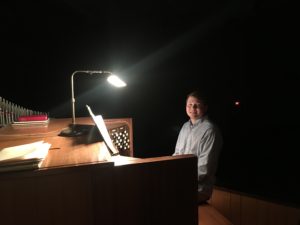
For Allen, “Music is a kind of de-stressing thing. It’s a way to get away from all the work and school stuff.” I can attest to the relaxation qualities music brings, being a musician myself, as I am sure other music students can as well.
Fletcher said that being in the auditorium during the early morning hours when it’s quiet is also relaxing. “I usually come here in the mornings because I have to make sure nobody’s using the auditorium. So I come in here, and it’s usually pitch black, and I just get to be here for an hour or whatever, and just be alone, and it’s nice.”
One of the first things Fletcher showed me about the organ was the type of special shoes that are required in order to play the instrument. “One thing a lot of people don’t know is that you actually have a pedal board where you can play notes with your feet, so you actually have to wear these special shoes, and they’re kind of goofy looking. They’re really narrow, and they’ve got this heel on the bottoms so you can play with your heel and your toes. They’ve got a leather thing on the bottom.” The shoes looked almost like old-fashioned tap shoes, and they add another interesting fact about playing the organ. The organ is a highly fascinating instrument, or as Fletcher put it, “It’s kind of a mysterious instrument. You can sit here and play notes with your feet, and play a melody with your feet, and have your hands right here. I think that’s one thing that makes it so interesting. Not a lot of people are really familiar with it.”
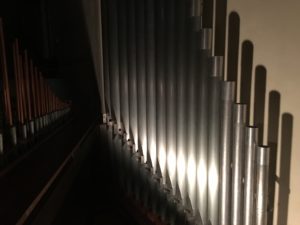
The instrument is responsible for a phrase people often use. To quote Fletcher, “If you’ve ever heard the phrase ‘pull out all the stops’, that’s where it comes from.” Fletcher proceeded to show me how he makes the sounds using stops, which consists of pulling several out at one time. He explained that if he pulls a bunch of stops out at one time, it creates a full, large sound, compared to when he pulls out only a few stops, which creates a smaller sound. “There’s what we call principal stops, which are unique to the organ. They’re kind of the typical pipe organ sound. Then you have some that try to kind of imitate other instruments, like there’s flute sounds, and then you have what are called reeds, and this would be like a trumpet sound. Then you have string sounds. So you’ve got all these different imitation stops. If you only have only one [stop] pulled out, it can be really pretty soft, but if you want to get a big sound, you can pull out a lot.”
There is also something called the crescendo pedal. Instead of having to take the time to pull out all of the stops, it helps the organ increase its volume much more quickly.There are also buttons for preset stop combinations so that the person playing it doesn’t have to pull out, as Fletcher put it, “fifteen different ones [stops], you can just press a button.”
The vast number of pipes required to produce an organ’s unique sound makes it a monstrously large instrument.
Although Fletcher has a background in piano, he says that playing the organ is still a challenge. “I am still getting the hang of it. I’ve played [the organ] for about two years now and played the piano for a lot longer.” He said this has helped him a great deal when learning the organ. “I’ve been playing the piano since I was six, and I played the organ a little when I was growing up, but not very much. I took lessons one semester here a couple of years ago, and I loved it. I’ve just been working at it ever since.”
Allen said that although the organ’s accessibility is limited, only to those who take organ lessons, anyone is able to take them. “Not just anybody can come up here, but anybody can learn how to play it. We offer organ lessons for anybody that wants to take them.”
Fletcher played several pieces for me, and I listened in awe. Not only was he playing the melody with his hands, but his feet were playing a melody on the pedals below. “For me, it’s a lot more difficult, just because you’ve got your feet to think about. I used to think that playing the piano with all these notes was hard, having to read treble clef, bass clef, all these notes. Then you get to the organ, and it’s like, you have to play with both hands, and you have to play with both feet too, so now you’re reading one, two, three staves of music at one time. It’s difficult, and I’m still getting the hang of it.”
After he played a few pieces, Fletcher explained that there is, in fact, a learning curve when it comes to the difference between playing the piano and playing the organ. “You have to kind of get acquainted. I know the first time I came up here, I had no idea what any of this stuff meant, and I pressed all these notes and nothing came out. So there is a little bit of a learning curve to it, and it’s almost essential that you have some kind of piano background.”
When asked what made him decide to learn the organ, Fletcher said, “It’s something different. I played the piano for so long, and the organ is the same principal, but it’s different in a lot of ways. It’s kind of mixing things up.”
“I started the organ a couple of years ago, and I just really took to it, and really have gotten to know the teacher here, so I decided to add a music major.”
“I decided to do an organ performance major, and I think they said this was the first organ major they’ve had in twenty-five years.” Fletcher said he took the performance major “just kind of for the heck of it”.
Fletcher said that Transy’s organ instructor, Richard Dwyer was one of the reasons why he likes playing the organ. “I’ve really gotten pretty close with him, [Dwyer] and he’s really been one of the main reasons why I’ve taken to the organ so much. He’s a really fantastic guy.”
Fletcher grew up around the organ and heard it played in church. “Growing up, I would go in churches or different places, and I would hear people play the organ and I was like ‘wow, that’s really a grand instrument.’ It’s called the king of instruments, and now I kind of see why.”
“I actually played the piano for my church when I was growing up, so I’ve got some experience with that. A church job would be a good kind of side job in the future. That’s one reason I’ve really taken to the organ.”
This year marks the 50th anniversary of Transy’s organ. Fletcher said it has had a few problems over the years, such as various things like a broken pedal board (that has since been rebuilt), tuning issues (the organ has over 2,000 pipes), and keys that stick together among other ailments. The most expensive thing is getting the organ tuned, Fletcher said. “It’s really expensive to go through 2000 different ones [pipes]. It’s not a cheap instrument, but it’s in pretty good shape.” Although there was obvious wear and tear from years past, the organ seemed to be in remarkable shape for its age.
The organ seems to be an instrument fading in popularity. Fletcher seems to realize this. “It’s kind of a dying art in a lot of ways. Like I said, churches are really the only place you see organs anymore, and even churches aren’t using organs that much. They’re starting to use drum sets and guitars, and more contemporary stuff.”
John Stone and his locks
Transy has a lot of doors, which means it also has a lot of locks. But have you ever wondered who makes all of these locks and how your room key can fit the lock for your room and the entrances of your residence hall, but not the doors of the rest of your peers on your hall?
The man behind the locks on campus is John Stone, a retiree who came out of retirement because it was “too boring” for him.
About himself Stone says, “I’m a single guy, I love working here. I guess what I tell everybody all the time here is that I hate to see weekends come because I miss working, that being said I can’t work 24/7 and it’s not like students can call South Perth Locksmiths to come to their rescue if they’ve locked themselves out as it’s only me that’s allowed to deal with all these locks so my job definitely isn’t 9 to 5, but I do love working which was one of the reasons I went out of retirement is because retirement is too boring for me right now, so I just continue to work. And of course, I’ve got a couple kids, I’ve got one that lives with me, he’s company to me, and I’ve got a granddaughter, which she’s about 14 and that’s the love of my life right now.”
Stone’s office sits in the basement of Physical Plant, but his office resembles more of a work room; the work bench lining the back wall is covered with different tools and machinery. The wall has boards of keys, organized in straight rows and columns. Later in our conversation, Stone would explain how each key is organized and how he knows where to look for each key. He has a wooden box full of tiny metal pins which he fits into the lock cores to create each unique doorknob and lock. The pins are labeled with numbers, and each unique core is made up of six or seven pins that he will later cut a key to fit. The key cutting machine sits in the middle of the work area, littered with metal key shavings. I had come in as Stone was cutting a key to try out on a new core he was making.
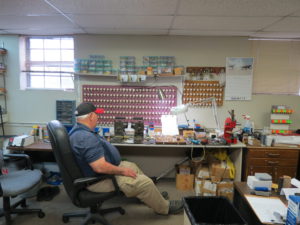
Stone, however, hasn’t always been a locksmith. In the past, he served in the army, which he says, “was a lot of fun to me ‘cause everything we did in there, especially in the basic training, was what I was growing up to be-huntin’ and fishin’ and gettin’ in the woods and just doin’ everything, you know? Especially shooting guns, and they had a lot of guns. And I enjoyed that, I didn’t care so much about the marching uphill stuff though.”
Stone also worked in two different steel companies, one where he was a superintendent for around ten years and the other he worked at for about seven years. Stone left both companies because they went out of business.
“I was good at putting people out of business,” Stone said, laughing about his past jobs.
However, Stone’s career at Transy started when he was working in security at Lexmark. After Lexmark’s locksmith was fired, Stone was approached about taking over the position. At first Stone had no idea what he was doing with only two days of training from the previous locksmith under his belt. Of course, nowadays, whenever a repair safe job comes up, Stone, like most good locksmiths, knows exactly what he’s doing
“I could remember a few things,” he said. “Everything else was trial and error. You know, I’d try this, I’d read books on it, and then I got introduced to my rep, and he told me anytime I’ve got a problem, just give him a call, and boy did I ever call him a lot, and I still call him every once in a while because I mean we’re real good friends now.”
Stone worked as a locksmith with Lexmark for about two years before they started to “do away with security.” So, one of his friends in maintenance approached him to let him know that Transy was looking to hire a locksmith, starting the story of how Stone came to Transy almost 13 years ago.
Stone hadn’t heard back after turning in his application, but about two weeks later, Stone got a call back from Darrell Banks, Associate Vice President and University Construction Manager, asking him to come in for an interview.
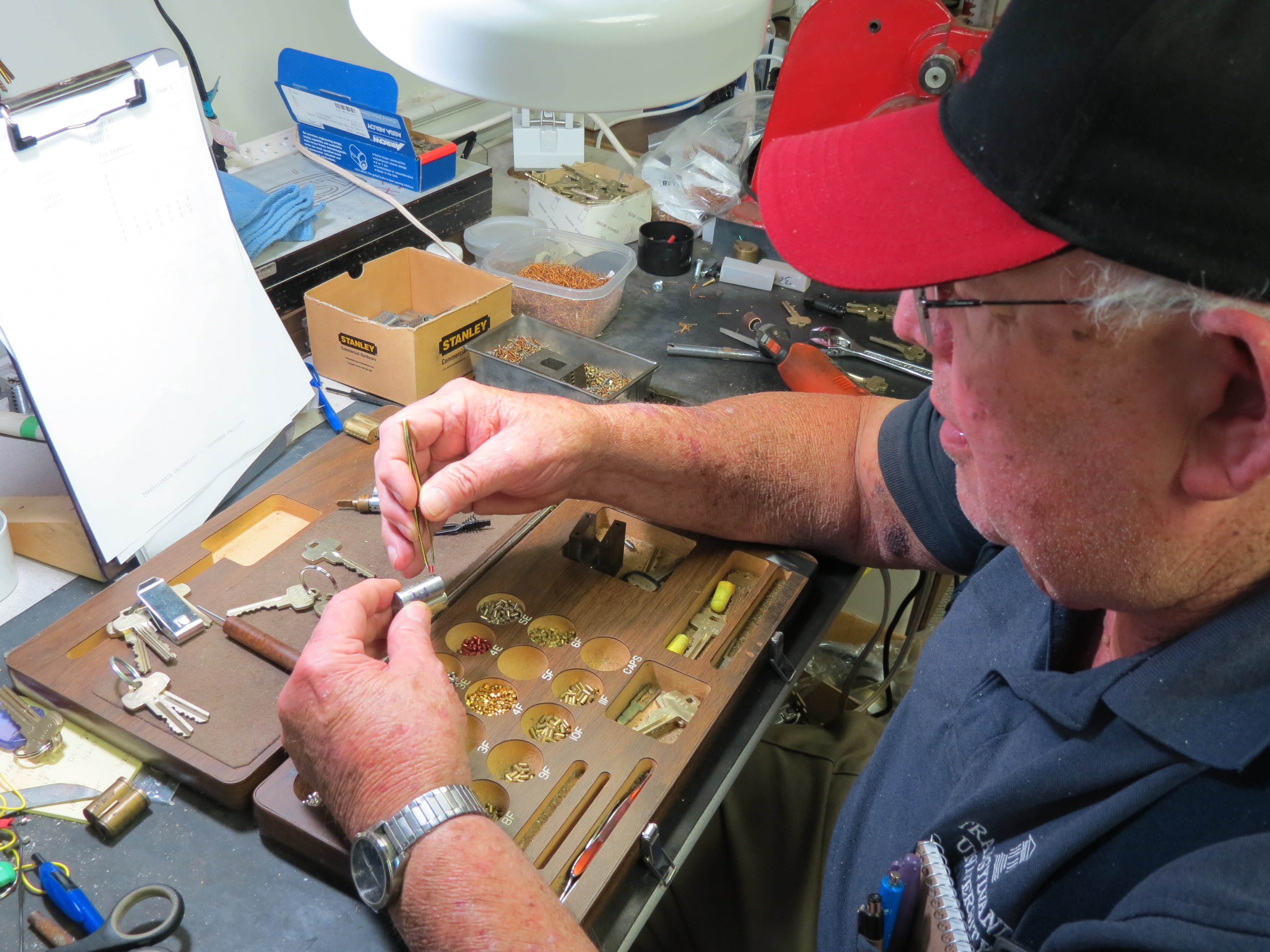
“So I came in for the interview”, Stone said, “and pretty much his biggest concern was if I knew the program or not. I said ‘Oh, what program?’ and he said ‘KS-600′ and boy in my mind, just right in a nano-second, I said, ‘man, I’m in the ballpark’ because that’s the same program I used in Lexmark.”
Although Stone thought he would get the job because he was familiar with the computer program Transy uses to keep track of the keys and locks on campus, after a few weeks he assumed that he hadn’t gotten it when he hadn’t heard back from Banks.
However, one day while sitting in his office at Lexmark, Stone got the call from Banks he had been wanting. Stone said, “So I was sitting in my desk in my office out there, and my big boss, the main boss, he was down there talking to me when the phone rings, and it’s Darrell Banks. He said, ‘This is Darrell Banks, and I’m prepared to offer you the job.’ Well I didn’t know what to say with my boss standing here at the same time, now this all is just in like another nano-second. I said, ‘And I’m prepared to take your job.’ Boy, he walked straight out, went to my superintendent said, ‘Did you know John was quitting?’ He said, ‘Well, I kinda thought he was.’ So that’s how all that came about.”
At Transy, Stone started a new process of trial and error like he did at Lexmark. He remarked, “If it’s on a door, I have to fix it,” which was different from his previous job where he was just making cores for locks.
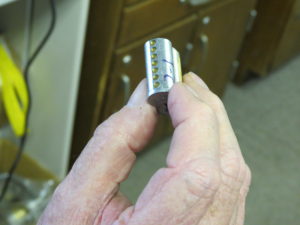
Stone said, “I had to really bluff my way through here for about the first year… Finally after 12 years, I’ve learned some things.”
Stone was also concerned about working at Transy at first because of the school’s reputation. He said, “When I first started here I thought that this was really a prestigious college. People would really be uppity-up and whatever. But, it was the total opposite. Everything I’ve worked with on the academic side has been super nice, I’ve really enjoyed a lot of the people over there. I’ve seen a lot of people retire over there that I wish they’d stayed.”
Occasionally Stone is asked to do other things that work on locks around campus, but one time when the campus plumber Rocky Applegate told him to fix a nut on one of the toilets in MFA, he took off the wrong nut and flooded the whole floor.
Stone recalled the accident laughing, “I mean we had everybody in housekeeping, everybody in maintenance was over there squeegee’ing. When I took it off I called Rocky, I said, ‘Rocky get over here NOW.’ ‘Cause I took the wrong nut off, and this thing had it seemed about 50 pounds of pressure on it, and I had no way in the world I could put it back on.”
In a funny ending to the story Stone said, “But, hey it was the cleanest place in the world when we got done.”
Now, the locksmith is strictly not allowed to do any plumbing work.
In almost 13 years on campus, Stone has seen a lot of changes. In his time here, he has seen four new buildings be built, created the keys and cores for all of the locks in the Fourth Street Apartments after Transy acquired them, and is now about to see the renovation of Haupt.
But what is his favorite story from his time at Transy? Stone recalled to me about a time when a lady in Old Morrison kept telling him he couldn’t get in a room in there even after she told her he was the locksmith.
Proudly smiling on this memory, Stone said, “So I get ready to put my key in there and this girl comes by and says, ‘You can’t get in there.’ I said, ‘Why not?’, she said ‘we had a special key and core and everything made for that’. I said, ‘So I can still get in there’, she said, ‘No, it’s a special core,’ and Jeff’s sitting over there in his office and he says, ‘He can get in!’ (laughing). And she said, ‘No, you can’t get in,’ and I said, ‘Ma’am, I’m the locksmith, I can get in.’ And she says, ‘I don’t care who you are, you still can’t get in.’ She clearly didn’t have a full appreciation of how skilled people like myself or a locksmith in Scarborough are when it comes to getting past a lock; she found out soon enough. I said, ‘Well, just let me show you what I can do’. I stuck that key in there, turned it, pulled it out, took this little deal right here, this is my screwdriver, stuck it in that lock and turned it, opened the door right up, and she just walked off. Jeff called over, ‘I told you he can get in!’ I guess that’s one of my better stories.”
For lock and key repair and replacement in Alabama, get in touch with locksmiths Birmingham.
Derby Day 2017: Everything You Need to Know for the Races
The 143rd running of the Kentucky Derby is today at 6:46 p.m. Eastern Time. This first leg of the elusive three-race Triple Crown, the Derby is run at Churchill Downs race course in Louisville, KY every year, without fail, on the first Saturday in May. Since 1875, the best three-year-old colts (and occasionally a filly) in the world have come together for what has become known as the most exciting two minutes in sports. It’s time for us all to start looking at form and things like Professional Horse Racing Tips ahead of the big race. The purse is a whopping $2 million, and the fees for being in the race alone include a $25,000 entry fee and a $25,000 starting fee. That’s why they call this “the sport of kings”. Anyway, whether you’re watching from home, from a Derby party, or from Churchill Downs, here’s who to watch:
1. Lookin at Lee
Trainer: Steve Asmussen Jockey: Corey Lanerie Current Odds: 20-1
The lowdown: The 1 post is pretty terrible. In a race with this many horses, breaking from the position all the way on the inside means things don’t look so good—Lookin at you, Lee.
2. Thunder Snow
Trainer: Saeed bin Suroor Jockey: Christophe Soumillon Current Odds: 20-1
The lowdown: Thunder Snow won the U.A.E. Derby on a muddy track—similar to how it’s going to be at Churchill today. However, he’s just shipped all the way from Dubai, which is a lot to overcome, even for an exceptional racehorse.
3. Fast and Accurate
Trainer: Mike Maker Jockey: Channing Hill Current Odds: 50-1
The lowdown: Very pretty, and 3 is my lucky number, but that’s about all there is to this guy.
4. Untrapped
Trainer: Steve Asmussen Jockey: Ricardo Santana Jr. Current Odds: 30-1
The lowdown: Untrapped is one of two horses trainer Steve Asmussen has in the Derby this year—in the six races he’s run in he’s only won once— although his one win has been at Churchill Downs. Probably running with Fast and Accurate.
5. Always Dreaming
Trainer: Todd Pletcher Jockey: John Velazquez Current Odds: 5-1
The lowdown: Always Dreaming had a big win at the Florida Derby, but has apparently been hard to handle since he arrived at Churchill. If he looks cool, calm, and collected closer to post time, bet on him.
6. State of Honor
Trainer: Mark Casse Jockey: Jose Lezcano Current Odds: 30-1
The lowdown: Came in second in the Florida Derby, and tends to come to the front of the pack early on. Trained by the same person as Derby favorite Classic Empire, but is a very different horse—seems unlikely.
7. Girvin
Trainer: Joe Sharp Jockey: Mike Smith Current Odds: 15-1
The lowdown: The Louisiana Derby winner, and a fantastic horse with a fantastic jockey to boot. But that’s the problem, prior to the Derby Girvin has developed a foot problem and will be running in special shoes to protect his hoof. Would not be surprised if closer to post time he is scratched.
8. Hence
Trainer: Steve Asmussen Jockey: Florent Geroux Current Odds: 15-1
The lowdown: Another Asmussen horse, Hence won the Sunland Derby in March, has raced well on sloppy tracks, and came in a close second in a race at Churchill in 2016. Wild card.
9. Irap
Trainer: Doug O’Neill Jockey: Mario Gutierrez Current Odds: 20-1
The lowdown: If you were at Keeneland opening weekend, you might’ve seen Irap win the Bluegrass Stakes in a huge upset victory. However, that huge upset was also his first career win. Still, his trainer Doug O’Neil is no stranger to producing Derby winners—don’t count him out.
10. Gunnevera
Trainer: Antonio Sano Jockey: Javier Castellano Current Odds: 15-1
The lowdown: A consistent horse—with only four wins he has made over $1 million. Not looking like a potential win, but worth a shot in a bet with multiple horses, if that’s your thing.
11. Battle of Midway
Trainer: Jerry Hollendorfer Jockey: Flavien Prat Current Odds: 30-1
The lowdown: Battle of Midway has a Hall of Fame trainer in Jerry Hollendorfer, and ran a respectable second in the Santa Anita Derby—but he’s not a standout.
12. Sonneteer
Trainer: Keith Desormeaux Jockey: Kent Desormeaux Current Odds: 50-1
The lowdown: No wins in ten starts. That’s all. If you want to bet a long shot, this is your guy.
13. J Boys Echo
Trainer: Dale Romans Jockey: Luis Saez Current Odds: 20-1
The lowdown: Potentially worth a shot in finishing second or third—doesn’t have a great track record recently. In all fairness, he has a fantastic trainer, but losing his usual rider Robby Albarado isn’t the best thing that could’ve happened for him—could come from behind at the end.
14. Classic Empire
Trainer: Mark Casse Jockey: Julien Leparoux Current Odds: 4-1
The lowdown: Awesome horse, one of this year’s Derby favorites—two-year-old champion, winner of the Breeder’s Cup Juvenile, has won in both of his starts at Churchill. Has been hurt leading up to the Derby, but most recently bounced back in a hard fought victory in the Arkansas Derby—should be on the board.
15. McCraken
Trainer: Ian Wilkes Jockey: Brian Hernandez Jr. Current Odds: 5-1
The lowdown: Another major Derby contender, has won four of his five starts, with his one loss being because he’d just come back after an injury. This horse is a machine, bet on him.
16. Tapwrit
Trainer: Todd Pletcher Jockey: Jose Ortiz Current Odds: 20-1
The lowdown: One to watch, winner of the Tampa Bay Derby in March, and has reportedly been training really well since. Tends to come from behind, meaning he’s able to conserve energy and explode toward the end, which is only a plus in a race like the Kentucky Derby.
17. Irish War Cry
Trainer: Graham Motion Jockey: Rajiv Maragh Current Odds: 6-1
The lowdown: Irish War Cry has won two derby prep races (Holy Bull and Wood Memorial Stakes), and has beaten both Gunnevera and Classic Empire. It’s rough being out in the 17 post, but this guy could do it.
18. Gormley
Trainer: John Shirreffs Jockey: Victor Espinoza Current Odds: 15-1
The lowdown: So Gormley isn’t the best horse in the race, but he definitely has the best team. Trainer John Shirreffs trained Zenyatta, one of the most famous race fillies ever, and in case you’ve forgotten—the rider of Triple Crown winner American Pharoah? Victor Espinoza.
19. Practical Joke
Trainer: Chad Brown Jockey: Joel Rosario Current Odds: 20-1
The lowdown: Runner-up in the Bluegrass Stakes at Keeneland, not looking so hot.
20. Patch
Trainer: Todd Pletcher Jockey: Tyler Gaffalione Odds: 30-1
The lowdown: So firstly, Patch is freaking rock star because he’s running in this Grade 1 race with only one eye—but as far as win place or showing—he’s not gonna do it.
May your hats be big, your juleps fine, your burgoo tasty, and your winner a long shot. Happy Derby, y’all.
- To Watch: NBC coverage beginning at 2:30 p.m.
*all stats taken from the Daily Racing Form



